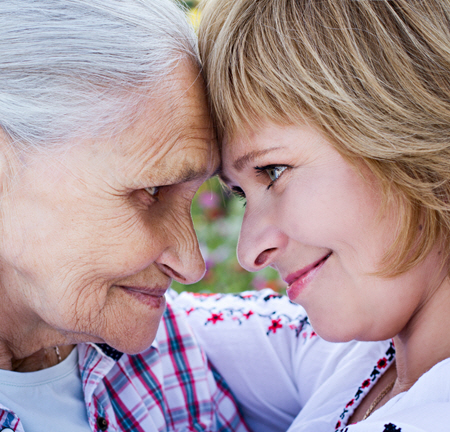Dealing with dementia is challenging for caregivers.
When a loved one receives a diagnosis of dementia or cognitive impairment, caregivers are often plunged into a sea of confusion, not knowing where to turn.
Dementia can be devastating for both the person experiencing it and the caregiver. Grief and loss often accompany the experience, as caregivers watch the painful process of decline.
The process can trigger various emotions and bring up painful family histories and dynamics.
 Carol* had firsthand experience with dementia.
Carol* had firsthand experience with dementia.
Carol recalls, “I remember the day that Mom’s doctor delivered the diagnosis of dementia. For quite a while, Mom had been losing things around the house. One day a police officer brought her home. Mom had gotten lost, and he helped her find her way back.
“Mom had asked the same questions repeatedly and could not seem to remember the people she knew or how to bake the cake she had been making for the past 50 years or even how to eat lunch without being reminded.
“I recall looking at my Dad that day, wondering how this now frail man, who could barely walk, was going to be able to care for Mom. My eyes filled with tears. I did not understand how we would all get through this. Once we received the diagnosis, we were left to deal with everything else on our own.”
Professional guidance helps prepare caregivers.
As a certified dementia specialist, I direct caregivers to the resources they need to help with current and future planning. I provide information about treatment options and work with other geriatric professionals to obtain the best care for your loved one.
Caregivers receive help in understanding different types of dementia and the symptoms and stages of the disease.
With my guidance, caregivers receive help in understanding the meaning behind dementia behaviors and are provided with strategies to deal with challenging situations.
 Caregivers will experience emotional challenges.
Caregivers will experience emotional challenges.
Caregiving for a parent or spouse is one of the most challenging types of relationships, placing caregivers at risk for developing depression or illness. Counseling helps the caregiver process emotions that arise in caregiving.
Through counseling, caregivers learn how to decrease anger and frustration, and gain new coping skills and strategies to reduce anxiety and stress.
Caregivers also need to learn self-care skills that will enable them to continue the marathon of caregiving, and counseling teaches caregivers how to survive in the long run.
Let’s work to reduce your caregiving challenges.
For the past 20 years, I have been working with elders and their families to help them take care of their loved ones.
If you or someone you know is struggling with caregiving for a loved one, contact me today by calling (216) 785-9466 to get the support and help you need to manage your caregiving journey’s trials.
Going it alone only increases the emotional rollercoaster. Counseling prepares you for caring for your loved one.
*Name changed to protect confidentiality.

